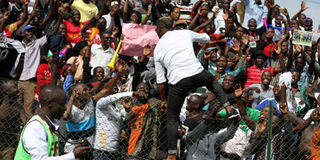The rise and fall of Paidha Black Angels

Paidha’s supporters braved long journeys all over the country in what will unfortunately end as a fruitless season. Case in point was when they earned promotion to the topflight. PHOTO BY FELIX WAROM OKELLO
PAIDHA- In the aftermath of Paidha Black Angels qualifying for topflight football last season, there was unprecedented excitement and hope that they would remain in the StarTimes Uganda Premier League (SUPL).
The team had to re-align its management and players to suit the pressures and workload in the top-tier competition.
Key on the first agenda was to rebuild the Barokoro Stadium so that it meets the standards of the Fufa Technical Committee. This demanded money for levelling, setting up a perimeter fence and sanitary facilities.
The club mainly depended on gate collections, membership of fans and contributions from the business communities and well-wishers.
This did not sustain the buying of new players and paying them promptly, and that is where things started going off track. First, the process to approve the stadium by Fufa took long and the club Paidha had to play most of their home games at Onduparaka’s Green Light Stadium. This meant a lot of cost in terms of transport from Paidha to Arua and hiring the stadium.
How Paidha rose
The club mainly depended on funding by the business community both in
Paidha and even neighbouring Democratic Republic of Congo. The latter is because of cordial relationships built with Clubs in DRC, especially in Mahagi District. The ardent fans that always kept with the club offered great morale as the gate collections always fluctuated between Shs15m to Shs20m per game.
Why the collapse
But with the club playing their home games away because of the delayed approval of their stadium, it was always going to be tough. Rasul Oryem, the club chairman, said earlier that the club was losing a lot in terms of revenue from gate collections.
“Most of the club fans did not manage to go to Arua and this has made us miss that home support, which is partly responsible for team’s poor performance in the Uganda Premier League. “This alone is a big blow to the club that survives on gate collections and hand-outs from well-wishers,” Oryem said.
At the time their home ground was at Green Light, the club used to part with Shs0.8m to Onduparaka for the use of the stadium, Shs100, 000 to hire security and another Shs60, 000 to hire the team doctors during games.
This is beside the expenses of transportation for their ‘home’ games from Paidha to Arua. Besides this, there has been management crisis where several sackings of coaches and CEOs. This created unstable administration.
At the height of the problems in management and winless games at the start of the season, some of the club executives and fans left and formed a new club, Paidha United, which is now playing in the District League. This left a huge gap to be filled as Paidha struggled to remain in the league.
The coaches
The club, during the Big League, depended on skills and expertise of their legendary players like Abraham Nega. They then brought in the services of Dudu Bosco who served from 2016-2017. Things went on well until they fell out with Dudu.
In January 2017, Kheri Hussein Ali, a former coach in Morocco, was appointed head coach until when he was also sacked.
Then Allan Kabonge came in to complete the job with a win at Namboole Stadium to clinch promotion to the Ugandan topflight.
Background
Paidha was formed in 1979 after the overthrow of former President Idi Amin. The youths at that time felt the urge to form a club that would enable them expose their talents within Paidha. The first match that was played was against the ex-soldiers of 1979 war which saw Paidha Black Angels win 2-0 at Bar Okoro and that acted as a stepping stone for the club.
Looming relegation
With the recruitment of Fred Akena as Deputy Chief Executive Officer, there were changes that were made to the playing staff.
He brought in the killed striker, Dickens Okwir, who managed to score some crucial goals. They then managed to win some of the games and share spoils in the other fixtures.
But unluckily, the club sold Cromwel Abang Rwothomio, the star striker of the Club, to URA.
Some believe that Rwothomio could have partnered well with Okwir, but the club also needed the money to sort out some of the outstanding administrative expenses. The club was then caught in a dilemma of sorts.
Unfortunately, last weekend, the management decided to sack Akena over alleged malpractices. Currently, the club is faced with relegation to the Fufa Big League, in which they struggled for years to come out of.
On February 14, Fufa cleared the Barokoro Stadium that had fresh grass after a long standoff. Fufa Chief Executive Officer Edgar Watson said: “The club is required to ensure that minimum club licensing requirements are maintained for the rest of the season.”
Fufa did not approve Barokoro Stadium on grounds that it had unwanted weed on the pitch though it was fully covered with green grass after leveling and planting was done.
This, according to one fan, Cosmas Ogen, was a huge relief. “Traveling to Arua for our home games all the time was so expensive, hectic and risky because many of them travelled by boda-boda. “Even some of the fans got involved in accidents but for the love of the game and our team, we sacrificed to move every time they played in Arua.”
Gate collections
In the first game played against Nyamityobora at Barokoro Stadium after Fufa clearance, they managed to collect Shs21m. Barokokoro Stadium, that was a fortress during the Big League days, now has a capacity of about 5,000 fans. The fans build some pavilions to make them comfortable.




